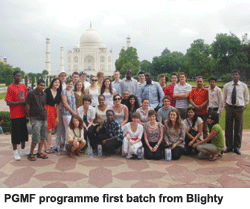Although it’s doubtful whether the passage to India of newly-elected British prime minister David Cameron in end July with the largest ever British trade delegation will give Indo-British trade a significant boost, education interaction and co-operation between the two countries, which have a long historical connection (most of India’s legacy boarding schools and top-ranked universities were established by enlightened British liberals during the heyday of the British raj), is likely to intensify. For a start, the UK-India Education and Research Initiative (UKIERI), launched in 2006, was renewed for five years (2011-2015). UKIERI is a five-year programme which aims to substantially improve educational ties between India and the UK — almost 600 new partnerships between British and Indian institutions at all levels of the education system have been established. “To date, it has committed over £20 million (Rs.145 crore) to support hundreds of bilateral partnerships between India and the UK,” says a UKIERI press release.
 During Cameron’s visit an inter-government agreement was also signed to create a UK-India Future Leaders Network. Under this agreement 20 exceptional young people from diverse fields — civil society, arts, media, politics and business — from both countries will be identified to initiate the network in October 2010 under the aegis of Common Purpose, a London-based leadership development organisation.
During Cameron’s visit an inter-government agreement was also signed to create a UK-India Future Leaders Network. Under this agreement 20 exceptional young people from diverse fields — civil society, arts, media, politics and business — from both countries will be identified to initiate the network in October 2010 under the aegis of Common Purpose, a London-based leadership development organisation.
Almost coinciding with Cameron’s high-profile India sojourn, 30 ‘A’ level (Plus Two) British students arrived in Delhi for a month-long tour of India under the Prime Minister’s Global Fellowship (PMGF) programme. Coordi-nated by British Council, India and spread over August, PMGF selects 100 British ‘A’ level students on the threshold of entering university, and facilitates their exposure to the life, people, culture, and business environ-ments of several countries, particularly of China, India and Brazil.
“The philosophy behind this initiative is that we now live in a globalised world where success and innovation are not confined by regional boundaries. To be successful, young people need to be equipped with the knowledge and confidence necessary to succeed in a rapidly changing global environment,” says a British Council spokesperson.
PGMF is dutifully endorsed by British and Indian multinational companies. “We hope the global fellows acquire insights into the importance of devel-oping into responsible global citizens,” says Kalyan Krishnan, who heads the corporate citizenship practice of KPMG, India.
The 30-day PGMF programme is divided into three phases. In the first phase the students learn about the culture and language of the host country while lodging with a local family. In the second phase, they interact with their peers in a school, and in the third work with a company to experience the business environment, industry standards, the company’s global mission and vision and how it interacts with the wider community. This year’s batch of 30 PGMF students were spread over Delhi, Mumbai and Bangalore.
“It is a great opportunity to discover the culture and business environment of Delhi. It has certainly added to my perspective and will help others when I make presentations back home,” says Lola O’Reilly who spent two weeks at Dorling Kindersley (DK) India, whose parent company, the London-based Pearson PLC, is a host company under the PGMF programme.
Unsurprisingly, British higher secondary students are less than impr-essed with Indian schools. “Schools back home tend to be better equipped with libraries and other infrastructure. Moreover in the UK peer and indepen-dent learning is encouraged whereas teacher-led pedagogies are the norm in India,” says Christopher Price, another visiting student interning at the Pearson office in Noida.
Clearly, Britain’s interrupted education development mission in the erstwhile brightest jewel of the imperial crown needs to be revived.
Autar Nehru (Delhi)